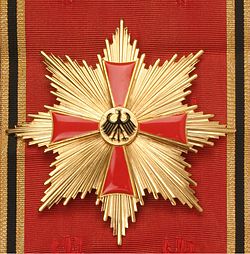| Order of Merit of the Federal Republic of Germany | |
|---|---|
 Special Class of the Grand Cross (reserved for heads of state) | |
| Type | Order of merit with one special and eight regular classes |
| Country | Federal Republic of Germany |
| Presented by | the President of Germany |
| Eligibility | Civilian and military personnel |
| Established | 7 September 1951 |
| Total | 262,532 (as of December 31, 2022)[1] |
| Website | bundespraesident.de |
Grand Cross Special Class
Medal Ribbon bars of the Order of Merit | |
The Order of Merit of the Federal Republic of Germany (German: Verdienstorden der Bundesrepublik Deutschland, or Bundesverdienstorden, BVO)[2] is the only[clarification needed] federal decoration of Germany. It is awarded for special achievements in political, economic, cultural, intellectual or honorary fields. It was created by the first President of the Federal Republic of Germany, Theodor Heuss, on 7 September 1951. Colloquially, the decorations of the different classes of the Order are also known as the Federal Cross of Merit (Bundesverdienstkreuz).
It has been awarded to over 262,000 individuals in total, both Germans and foreigners.[3] Since the 1990s, the number of annual awards has declined from over 4,000, first to around 2,500, then from 2015 to under 1,500, with a low of 918 awards in 2022.[3] Since 2013, women have made up a steady 30–35% of recipients.[3]
Most of the German federal states (Länder) have each their own order of merit as well, with the exception of the Free and Hanseatic Cities of Bremen and Hamburg, which reject any orders (by tradition their citizens, particularly former or present senators, will refuse any decoration in the form of an order, the most famous example being former Chancellor Helmut Schmidt).[4]
- ^ "Verdienstorden der Bundesrepublik Deutschland". www.bundespraesident.de (in German). Retrieved 17 October 2024.
- ^ The Oxford dictionary of abbreviations (2nd ed.). Oxford University Press. 1992. p. 70. ISBN 978-0-19-280073-2. Retrieved 27 October 2018.
- ^ a b c The Order of Merit of the Federal Republic of Germany, English; German, statistics, both Website of the President, and accessed 29 March 2014.
- ^ Binder, Elisabeth (6 September 2001). "Bundesverdienstkreuz: Das Kreuz mit dem Dank". Der Tagesspiegel (in German). Retrieved 22 March 2017.